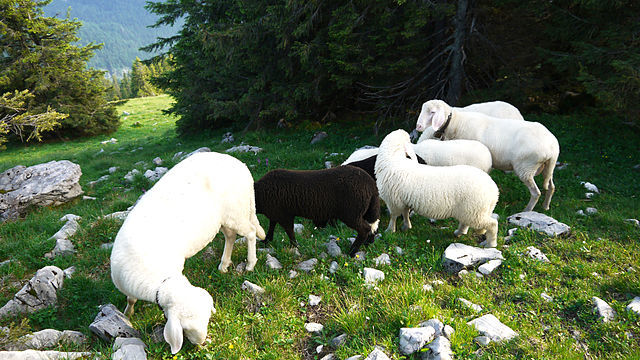Shaving The 3 Sheep
 A farmer has 10 sheep, of which 4 are black and 6 are white. He would like to take 3 of the sheep to the shearing shed to be shaved. How many different groups of 3 sheep can he select that would have at least one black one?
A farmer has 10 sheep, of which 4 are black and 6 are white. He would like to take 3 of the sheep to the shearing shed to be shaved. How many different groups of 3 sheep can he select that would have at least one black one?
The sheeps are different from each other.
Image credit: Wikipedia
The answer is 100.
This section requires Javascript.
You are seeing this because something didn't load right. We suggest you, (a) try
refreshing the page, (b) enabling javascript if it is disabled on your browser and,
finally, (c)
loading the
non-javascript version of this page
. We're sorry about the hassle.
8 solutions
Nice approach. Makes it short and sweet.
Great one .....
same way :)
Log in to reply
Great minds think alike :)
@Justin Wong its really simple bro , the first one is fixed and it must be a black one, so the comination is just for the rest two positions which has three possible options either Black-white or black-black or White- White.Hence we have three distinct groups only.
damn i dont read the last sentences
oh ! i forgot about the white ones
There are 4 Black sheep and 6 White sheep. All sheep look different as mentioned in question i.e. they are not identical. Now we have to choose 3 sheep and atleat 1 Black sheep. So we can choose either 1,2,3 black sheep. When 1 Black sheep and 2 whites sheep are chosen: No. of ways= C(4,1) x C(6,2)= 60 When 2 Black sheep and 1 white are chosen: No. of ways= C(4,2) x C(6,1)= 36 When 3 Black sheep and no white sheep are chosen: No. of ways= C(4,3) x C(6,0)=4 So total no. of ways is 60+36+4=100
Total no of combinations to have 3 sheeps(10C3) - total no of combinations for all three to be white(6C3) = Total no of combinations to have 3 sheeps where atleast one sheep is black
10C3-6C3=100
Yaps. same with my answer.
I have not learnt this method
- One Black Sheep 6 C 2 × 4 C 1
- Two Black Sheep 6 C 1 × 4 C 2
- All Black Sheep 4 C 3
- At least one black sheep = 6 C 2 × 4 C 1 + 6 C 1 × 4 C 2 + 4 C 3 = 1 5 × 4 + 6 × 6 + 4
= 6 0 + 3 6 + 4 = 1 0 0
no black sheep: 6c3 total groups: 10c3 at least 1 black sheep: 10c3- 6c3
good solution
he can choose : 1 black + 2white, 2 black + 2white or 3 blacks. =>4c1 6c2 +4c2 6c1 +4c3 =(4 15)+(6 6)+4=100
Sorry but I didn't get you . So can you elaborate .
In order to find the number of combinations with at least one black sheep, we subtract the total combinations of 0 black sheep from all combinations of 3 sheep. The total number of sheeps is 10C3=120 and the number of combinations of no black sheeps is 6C3=20. Thus, our answer is 120-20=100.
its just 10c3 - 6c3 its so simple
You have to elaborate it.....
taking 1 black out of 4 and other two from 6 whites+ taking 2 black out of 4 and other 1 from 6 whites + taking 3 black out of 4 and NOTHING from 6 whites: combination 4C1 X 6C2 + 4C2 X 6C1+ 4C3 X 6C0 = 60+36+4= 100 which is the answer
4C3 + 4C1 * 6C2 + 4C2 * 6C1 = 100....
10C3 - 6C3 = 100
Why are these numbers relevant to the solution?
Use a form of complementary counting so that the number of total ways to choose a group of 3 sheep is T and the number of ways to choose a group of 3 with no black sheep is N . The desired answer is the number of ways to choose a group of 3 sheep with at least 1 being black, in other words T − N . The total number of ways to choose 3 sheep out of 10 (4 black with 6 white) is simply 1 0 C 3 , which is 1 2 0 . The number of ways to choose a group of 3 white sheep is just to choose from the pool of white sheep; in other words, 6 C 3 which is 2 0 . Hence, T − N = 1 0 0 .